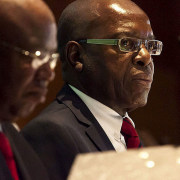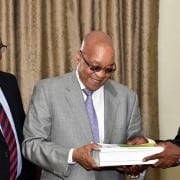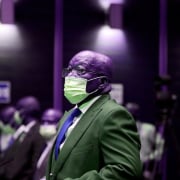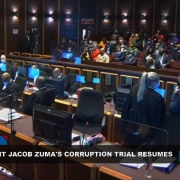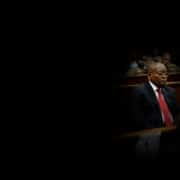|
Getting your Trinity Audio player ready...
|
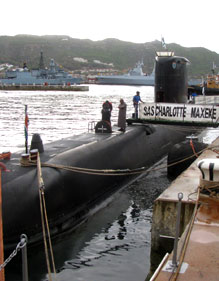 Source: Lawyers for Human Rights
Source: Lawyers for Human Rights
Lawyers for Human Rights (LHR) – representing Andrew Feinstein, Hennie van Vuuren and Paul Holden – was hindered last week from effectively cross-examining Rear Admiral Jonathan Kamerman on his technical knowledge of the purchase of corvettes forming part of the multibillion-rand arms deal and the allegations of corruption against him.
Kamerman is currently employed by ThyssenKrupp Marine Systems, which he joined a few months after retiring from the navy in 2006. ThyssenKrupp Marine Systems is a subsidiary of ThyssenKrupp, which won considerable contracts in the arms deal. Former defence minister Mosiuoa Lekota confirmed in an answer to Parliament that this violated the arms deal contracts, which placed a ban on employees of the SANDF taking up employment with arms deal contractors for eight years in order to prevent conflicts of interest through post-employment, and that Kamerman did not have the requisite permission.
LHR’s request to reserve the right to cross-examine Kamerman was ignored by the Arms Procurement Commission when no ruling was made.
Following the completion of his evidence, LHR was asked whether it intended to cross-examine him. LHR explained that severe time restrictions for the consideration of new statements and evidence made it impossible to effectively cross-examine.
Being given one day to consider Kamerman’s 765-page bundle of documentary evidence, make preparing and conducting a proper cross-examination impossible.
“It appears to us that the manner in which Admiral Kamerman has been treated is inconsistent with, and more favourable than, the manner in which our clients have been treated,” LHR said in its submissions.
This has been explained by pointing out that Kamerman had been given access to the draft witness statement of Richard Young and joint submission of Feinstein and Holden before writing his own statement. The so-called critics have not been afforded this same opportunity.
Barred from accessing information
It was also explained by LHR that Kamerman had been granted access to documents in the possession of the commission, presumably at his request. LHR is still awaiting the provision of documents that were requested well over 12 months ago. LHR’s clients cannot rely on documents in the possession of the commission because they are not given access to them. Our clients also cannot rely on documents sourced outside the commission, such as the draft auditor-general’s report or a report commissioned by German arms company Ferrostaal which details their own involvement in bribe payments of $40-million in the arms feal, because the commission has ruled such documents inadmissible.
It was because of this that LHR declined to cross-examine Kamerman and reserved the right to recall him at a future date after these documents had been delivered.
The request forms part of increasing frustrations around a lack of time to consider statements and documents related to the Seriti Commission of Inquiry into the Arms Deal. LHR is equally concerned about the lack of access to key documents that are vital to properly prepare cross-examination of witnesses and prepare clients’ statements. These are documents generally unfavourable to witnesses, and not put up by them, their legal teams or evidence leaders in the leading of their evidence.
A recent example was our inability to cross-examine former public enterprises minister Alec Erwin because of a lack of access to relevant documentation, including the contracts on which the procurement packages were based.
This lack of access to documents and time is an ongoing and growing concern. For the past year, we have only been given documents at the last minute and been expected to have thoroughly examined them and cross-examine as soon as the witness has completed their testimony.
We have requested a series of documents since February 2013. So far, we have only been given those that are attached to witness statements.
When requesting postponements to effectively prepare, we have been unfairly accused of stalling proceedings. Conversely, when evidence leaders and other counsel for the state ask for time to prepare, there is little resistance from the commission.
Our clients maintain their desire to participate fully in the commission but the only way to ensure that the truth is uncovered is to ensure a level playing field for all interested parties, access to documents and time to prepare for cross-examination.
While we are prevented from doing so, the evidence before the commission remains one-sided. Witnesses, including those with serious allegations against them, are let off the hook lightly, without adequate or thorough investigation – rendering this process meaningless.
We call on Judge Seriti and the entire commission to put to a stop to efforts that show clear bias and appear intent on limiting the public’s right to know the truth about allegations of corruption in the arms deal.
ANDREW FEINSTEIN, PAUL HOLDEN AND HENNIE VAN VUUREN via LAWYERS FOR HUMAN RIGHTS


